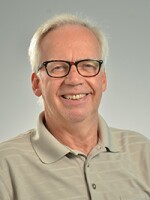Major League Baseball’s All-Star Game is taking place this week in Washington, D.C., with Salvador Perez representing the Royals.
But there’s another Kansas City tie: The first All-Star game was played in 1933, the same year the Washington (D.C.) Senators went to the World Series with a first baseman who was known around Kansas City, Missouri. His name was Joe Kuhel (pronounced “cool”).
During and after his major league career, Kuhel became well-known around Kansas City. Today he’s mostly forgotten — except to John Hager, who coaches and has been involved for more than 50 years with 3&2 baseball. Kuhel helped start the league in 1943 for kids up to 16.
“I remember Joe Kuhel (lived) right down the street from my grandma,” Hager said. “I remember (him) I was a kid, then when we used to have the Kansas City Blues.”

For one season, Kuhel managed the Kansas City Blues, a New York Yankees farm team. This was in 1950, when pitcher Whitey Ford started the year for the Blues, then headed to New York, going 9-1 down the stretch to launch his Hall of Fame career.
Kuhel played for the Blues when they won the Little World Series (the minor-league championship) in 1929. He was a slick-fielding first baseman, but the Yankees already had a guy at first — Lou Gehrig. So, the Washington Senators purchased Kuhel for more than $60,000; that’s after the stock market crash and equivalent to more than $900,000 today.
Kuhel could hit, too. On the Senators’ pennant-winning season in 1933, Kuhel drove in 107 runs. In 1936, he drove in 118 with 16 homers. After he was traded to the Chicago White Sox in 1938, Kuhel hit 27 homers two years later, a career-high.
All in all, Kuhel played in the big leagues for 18 seasons (1930-47) and managed the Senators in 1948 and 1949.
Kuhel, a Cleveland native who settled in Kansas City after meeting his future wife while playing for the Blues, was well known around town.
“If you knew sports at all, you knew Joe Kuhel,” said his only son, Joe Kuhel Jr., “because a lot of times I’d go somewhere. I don’t care if it was to get a piece of meat at a meat market. ‘Hey, that’s Joe’s boy.’”
Besides his skills with a baseball glove, Joe Kuhel Sr. had a sleight of hand and would perform card tricks for kids around Kansas City.

But what stood out most about him?
“I think his immense love of the game. Along with my dad, the conversation was always centered around baseball,” said Kansas City resident Barbara Altgott, whose father (Bob Beasley) scouted amateur players for the Washington Senators (and, when the Senators moved, the Minnesota Twins).
Joe Kuhel Jr. agrees that his father liked to talk baseball, but added that his father was reticent about his own career.
“Truly, he wouldn’t speak about himself a lot, or his accomplishments a lot unless he was with family. Or someone he trusted a lot. He’d open up. But other than that he truly was a humble man,” he said.
The only sign that acknowledges the history of amateur baseball at the 3&2 complex off Bannister Road in Kansas City is Hager Field, named after Hager (“I didn’t know they were going to do that,” he said. “Some people got together and did that for me.”)
The organization has seen some stellar players come through the ranks, people like David Cone, the 1994 Cy Young Award winner for the Kansas City Royals.

But if Hager had his way, some of the league pioneers like Kuhel would be recognized.
“I thought about putting up some plaques or memorial and just building it out here,” he said. “But I just want to make sure nobody breaks into it; it’s left unattended throughout the winter. But I would love to do that for all the old-timers.”
Joe Kuhel, who died in 1984 at 77, was laid to rest at Forest Hill Cemetery in Kansas City. His gravestone is near other a couple of other KC big-time baseball figures — Satchel Paige and Buck O’Neil.
Greg Echlin is a freelance sports writer for KCUR 89.3.


